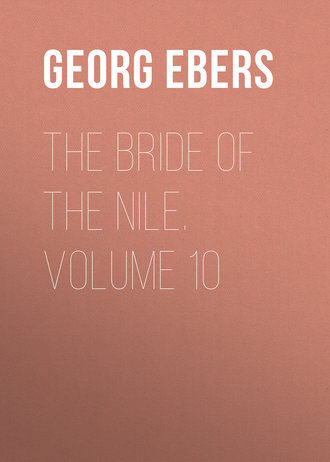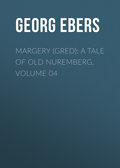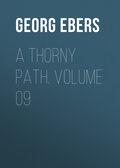
Georg Ebers
The Bride of the Nile. Volume 10
The discussion to-day dealt with the social aspects of an ancient civilization, unknown but a few years since to the warlike children of the desert, and yet how ably had the four overseers of public buildings the comptrollers of the markets, of the irrigation works, and of the mills, achieved their ends. These bright and untarnished spirits were equal to the hardest task and capable of carrying it through with energy, acumen, and success.
And the sons of these men who had passed through no school were already well-fitted and invited to give new splendor to cities in their decline, and new life to the learning of the countries they had subdued. Everything in this council revealed talent, vitality, and ardor; and Obada, who had been a slave, found it by no means easy to uphold his pre-eminence among these assertive scions of free and respectable families.
The Kadi spoke frankly and fearlessly against his recent proceedings, declaring in the name of every member of the Divan, that they disclaimed all responsibility for what had been done, and that it rested on the Vekeel alone. Obada was very ready to accept it; and he announced with such fiery eloquence his determination to give shelter at Fostat to the natives whom the conflagration had left roofless, he was so fair-spoken, and he had shown his great qualities in so clear a light during the past night, that they agreed to postpone their attainder and await the reply from Medina to the complaints they had forwarded. Discipline, indeed, required that they should submit; and many a man who would have flown to meet death on the field as a bride, quailed before the terrible adventurer who would not shrink from the most hideous deeds.
Obada had won by hard fighting. No one could prove a theft against him of so much as a single drachma; but he nevertheless had to take many a rough word, and with one consent the assembly refused him the deference justly due to the governor's representative.
Bitterly indignant, he remained till the very last in the council- chamber, no one staying with him, not even his own subalterns, to speak a soothing word in praise of the power and eloquence of his address, while the same cursed wretches would, under similar circumstances, have buzzed round Amru like swarming bees, and have escorted him home like curs wagging their tails. He ascribed the contumely and opposition he met with to their prejudice, as haughty, free-born men against his birth, and not to any fault of his own, and yet he looked down on them all, feeling himself the superior of each by himself; if the blow in Medina were successful, he would pick out his victims, and then….
His dreams of vengeance were abruptly broken by a messenger, covered with dust from head to foot; he brought good news: Orion was taken and safely bestowed in the Kadi's house.
"And why not in mine?" asked Obada in peremptory tones. "Who is the governor's representative here. Othman or I? Take the prisoner to my house."
And he forthwith went home. But instead of the prisoner there presently appeared before him an official of the Kadi's household, who informed him, from his master, that as the Khaliff had constituted Othman supreme judge in Egypt this matter was in his hands; if Obada wished to see the prisoner he might go to the Kadi's residence, or visit him later in the town prison of Memphis, whither Orion would presently be transferred.
He rushed off, raging, to his enemy's house, but his stormy fury was met by the placidity of a calm and judicial mind. Othman was a man between forty and fifty years old, but his soft, black beard was already turning grey; his noble dark face bore the stamp of a lofty, high-bred soul, and a keen but temperate spirit shone in his eyes. There was something serene and clear in his whole person; he was a man to bear the burthen of life's vicissitudes with dignity, while he had set himself the task of saving others from them so far as in him lay.
The patriarch's complaints had come also to the Kadi's knowledge, and he, too, was minded to exact retribution for the massacre of the Moslem soldiers; but the punishment should fall on none but the guilty. He would have been sorry to believe that Orion was one of them, for he had esteemed his father as a brave man and a just judge, and had taken many a word of good advice from the experienced Egyptian.
The scene between him and the infuriated Vekeel was a painful one even for the attendants who stood round; and Orion, who heard Obada's raging from the adjoining room, could gather from it some idea of the relentless hatred with which his negro enemy would persecute him.
However, as after the wildest storm the sea ebbs in ripples so even this tempest came to a more peaceful conclusion. The Kadi represented to the Vekeel what an unheard-of thing it would be, and in what a disgraceful light it would set Moslem justice if one of the noblest families in the country—to whose head, too, the cause of Islam owed so much—were robbed of its possessions on mere suspicion. To this the Vekeel replied that there were definite accusations brought by the head of the native Church, and that nothing had been robbed, but merely confiscated and placed in security. As to what Allah had thought fit to destroy by fire, no one could be held answerable for that. There was no "mere suspicion" in the case, for he himself had in his possession a document which amply proved that Paula, Orion's beloved, had been the instigator of the crime which had cost the lives of twelve of the true believers.—The girl herself had been taken into custody yesterday. He would cross-examine her himself, too, in spite of all the Kadis in the world; for though Othman might choose to let any number of Moslems be murdered by these dogs of Christians he, Obada, would not overlook it; and if he did, by tomorrow morning the thousand Egyptians who were digging the canal would have killed with their shovels the three Moslems who kept guard over them.
At this, Othman assured the Vekeel that he was no less anxious to punish the miscreants, but that he must first make sure of their identity, and that, in accordance with the law, justly and without fear of man or blind hatred, with due caution and justice. He, as judge, was no less averse to letting off the guilty than he was to punishing the innocent; so the enquiry must be allowed to proceed quietly. If Obada wished to examine Paula he, the Kadi, had no objection; to preside over the court and to direct the trial was his business, and that he would not abdicate even for the Khaliff himself so long as Omar thought him worthy to hold his office.
To all this Obada had no choice but to agree, though with an ill-grace; and as the Vekeel wished to see Orion, the young man was called in. The huge negro looked at him from head to foot like a slave he proposed to buy; and, when Othman went to the door and so could not see him, he could not resist the malicious impulse: he glanced significantly at the prisoner, and drew his forefinger sharply and quickly across his black throat as though to divide the head from the trunk. Then he contemptuously turned his back on the youth.
CHAPTER XVI
In the course of the afternoon the Vekeel rode across to the prison in Memphis. He expected to find the bishop there, but instead he was met with the news that Plotinus was dead of the pestilence.
This was a malignant stroke of fate; for with the bishop perished the witness who could have betrayed to him the scheme plotted for the rescue of the nuns.—But no! The patriarch, too, no doubt, knew all.
Still, of what use was that at this moment? He had no time to lose, and Benjamin could hardly be expected to return within three weeks.
Obada had met Paula's father in the battle-field by Damascus, and it had often roused his ire to know that this hero's name was held famous even among the Moslems. His envious soul grudged even to the greatest that pure honor which friend and foe alike are ready to pay; he did not believe in it, and regarded the man to whom it was given as a time- serving hypocrite.
And as he hated the father so he did the daughter, though he had never seen her. Orion's fate was sealed in his mind; and before his death he should suffer more acutely through the execution of Paula, whether she denied or owned her guilt. He might perhaps succeed in making her confess, so he desired that she should at once be brought into the judge's council-room; but he failed completely in his attempt, though he promised her, through the interpreter, the greatest leniency if she admitted her guilt and threatened her with an agonizing death if she refused to do so. His prisoner, indeed, was not at all what he had expected, and the calm pride with which she denied every accusation greatly impressed the upstart slave. At first he tried to supplement the interpreter by shouting words of broken Greek, or intimidating her by glaring looks whose efficacy he had often proved on his subordinates but without the least success; and then he had her informed that he possessed a document which placed her guilt beyond doubt. Even this did not shake her; she only begged to see it. He replied that she would know all about it soon enough, and he accompanied the interpreter's repetition of the answer with threatening gestures.
He had met with shrewd and influential women among his own people; he had seen brave ones go forth to battle, and share the perils of a religious war, with even wilder and more blood-thirsty defiance of death than the soldiers themselves; but these had all been wives and mothers, and whenever he had seen them break out of the domestic circle, beyond which no maiden could ever venture, it was because they were under the dominion of some passionate impulse and a burning partisanship for husband or son, family or tribe. The women of his nation lived for the most part in modest retirement, and none but those who were carried away by some violent emotion infringed the custom.
But this girl! There she stood, immovably calm, like a warrior at the head of his tribe. There was something in her mien that quelled him, and at the same time roused to the utmost his desire to make her feel his power and to crush her pride. She was as much taller than the women of his nation as he was taller than any other captain in the Moslem army; prompted by curiosity, he went close up to her to measure her height by his own, and passed his hand through the air from his swarthy throat to touch the crown of her head; and the depth of loathing with which she shrank from him did not escape his notice. The blood mounted to his head; he desired the interpreter to inform her that she was to hope for no mercy, and inwardly devoted her to a cruel death.
Pale, but prepared to meet the worst, Paula returned to the squalid room she occupied with her faithful Betta.
Her arrival at the prison had been terrible. The guards had seemed disposed to place her in a room filled with a number of male and female criminals, whence the rattle of their chains and a frantic uproar of coarse voices met her ear; however, the interpreter and the captain of the town-watch had taken charge of her, prompted by Martina's promise of a handsome reward if they could go to her next morning with a report that Paula had been decently accommodated.
The warder's mother-in-law, too, had taken her under her protection. This woman was the inn-keeper's wife from the riverside inn of Nesptah, and she at once recognized Paula as the handsome damsel who had refreshed herself there after the evening on the river with Orion, and whom she had supposed to be his betrothed. She happened to be visiting her daughter, the keeper's wife, and induced her to do what she could to be agreeable to Paula. So she and Betta were lodged in a separate cell, and her gold coin proved acceptable to the man, who did his utmost to mitigate her lot. Indeed, Pulcheria had even been allowed to visit her and to bring her the last roses that the drought had left in the garden.
Susannah had carried out her purpose of sending her food and fruit; but they remained in the outer room, and the messenger was desired to explain that no more were to be sent, for that she was supplied with all she needed.
Confident in her sense of innocence, she had looked forward calmly to her fate building her hopes on the much lauded justice of the Arab judges. But it was not they, it would seem, who were to decide it, but that black monster Orion's foe; crushed by the sense of impotence against the arbitrary despotism of the ruthless villain, whose victim she must be, she sat sunk in gloomy apathy, and hardly heard the old nurse's words of encouragement.
She did not fear death; but to die without having seen her father once more, without saying and proving to Orion that she was his alone, wholly his and for ever—that was too hard to bear.
While she was wringing her hands, in a state verging on despair, the man who had ruined the happiness, the peace, and the fortunes of so many of his fellow-creatures was cantering through the streets of Memphis, mounted on the finest horse in Orion's stable, and firmly determined to make his defiant prisoner feel his power. When he reached the great market-place in the quarter known as Ta-anch he was forced to bring his steed to a quieter pace, for in front of the Curia—the senatehouse—an immense gathering of people had collected. The Vekeel forced his way through them with cruel indifference. He knew what they wanted and paid no heed to them. The hapless crowd had for some time past met here daily, demanding from the authorities some succor in their fearful need. Processions and pilgrimages had had no result yesterday, so to-day they besieged the Curia. But could the senate make the Nile rise, or stay the pestilence, or prevent the dates dropping from the palm-trees? Could they help, when Heaven denied its aid?
These were the questions which the authorities had already put at least ten times to the shrieking multitude from the balcony of the town hall, and each time the crowd had yelled in reply: "Yes—yes. You must!—it is your duty; you take the taxes, and you are put there to take care of us!"
Even yesterday the distracted creatures had been wholly unmanageable and had thrown stones at the building: to-day, after the fearful conflagration and the death of their bishop, they had assembled in vast numbers, more furious and more desperate than ever. The senators sat trembling on their antique seats of gilt ivory, the relics of departed splendor imitated from those of the Roman senators, looking at each other and shrugging their shoulders while they listened to a letter which had just reached them from the hadi. This document required them, in conformity with Obada's determination, to make known to the populace, by public proclamation and declaration, that any citizen whose house had been destroyed by the fire of the past night would be granted ground and building materials without payment, at Fostat across the Nile, where he might found a new home provided he would settle there and embrace Islam.
This degrading offer must be announced: no discussion or recalcitrancy could help that.
And what could they, for their part, do for the complaining crowd?
The plague was snatching them away; the vegetables, which constituted half their food at this season, were dried up; the river, their palatable and refreshing drink, was poisoned; the dates, their chief luxury, ripened only to be rejected with loathing. Then there was the comet in the sky, no hope of a harvest—even of a single ear, for months to come. The bishop dead, all confidence lost in the intercessions of the Church, God's mercy extinct as it would seem, withdrawn from the land under infidel rule!
And they on whose help the populace counted,—poor, weak men, councillors of no counsel, liable from hour to hour to be called to follow those who had succumbed to the plague, and who had but just quitted their vacant seats in obedience to the fateful word.
Yesterday each one had felt convinced that their necessity and misery had reached its height, and yet in the course of the night it had redoubled for many. Their self-dependence was exhausted; but there still was one sage in the city who might perhaps find some new way, suggest some new means of saving the people from despair.
Stones were again flying down through the open roof, and the members of the council started up from their ivory seats and sought shelter behind the marble piers and columns. A wild turmoil came up from the market- place to the terror-stricken Fathers of the city, and the mob was hammering with fists and clubs on the heavy doors of the Curia. Happily they were plated with bronze and fastened with strong iron bolts, but they might fly open at any moment and then the furious mob would storm into the hall.







